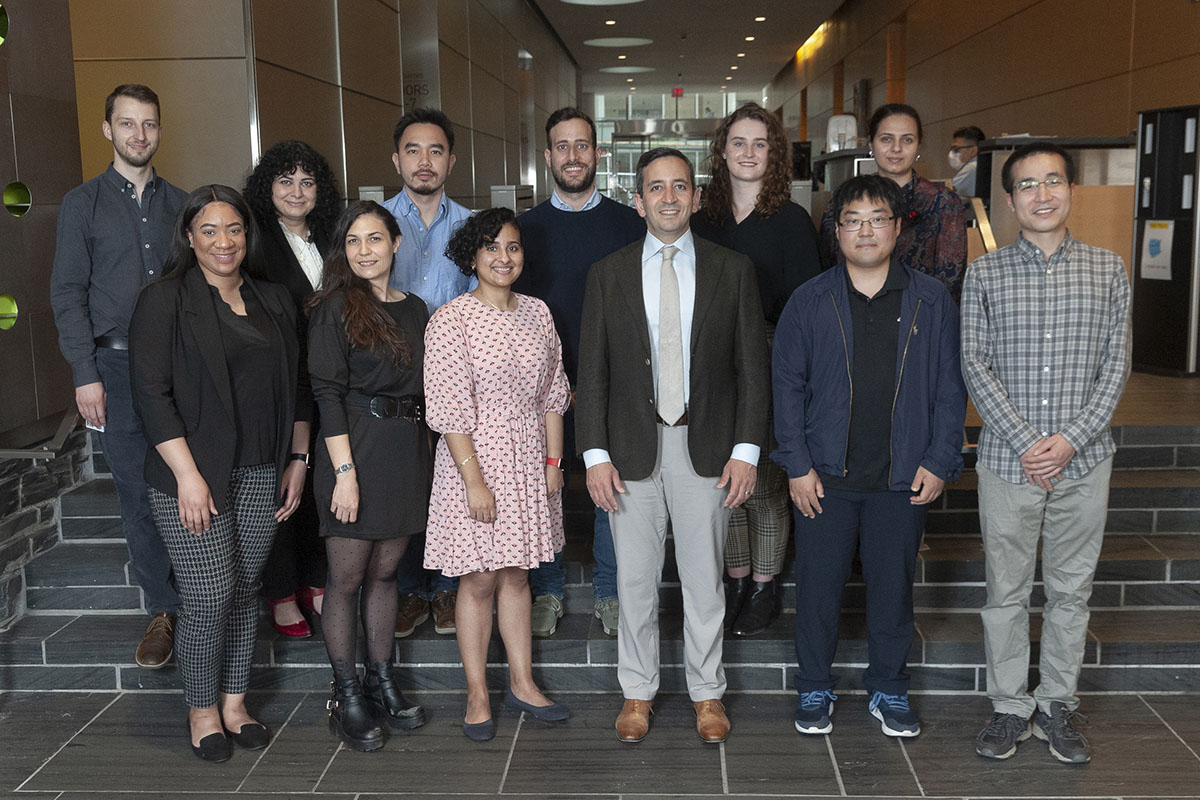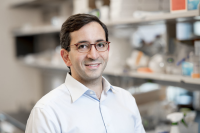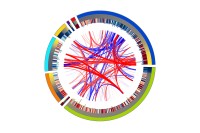Human Oncology & Pathogenesis Program
The Samuel Bakhoum Lab
Research

Associate Professor
The Bakhoum lab focuses on understanding the role of chromosomal instability (CIN) in tumor evolution and progression. CIN is a hallmark of human cancer, and it is associated with poor prognosis, metastasis, and therapeutic resistance. CIN results from errors in chromosome segregation during mitosis, leading to structural and numerical chromosomal abnormalities. In addition to generating genomic heterogeneity that acts as a substrate for natural selection, Our team has identified numerous mechanisms by which CIN drives cancer progression. First, we found that CIN promotes inflammatory signaling by introducing genomic double-stranded DNA into the cytosol, engaging cytosolic DNA-sensing antiviral innate immune pathways. Instead of eliciting anti-tumor immunity, CIN-induced chronic inflammation promotes immune suppression and metastasis. In addition, we also CIN as an potent driver of epigenetic heterogeneity and reprogramming through chromosome encapsulation in micronuclei. These multipronged effects distinguish CIN as a central driver of tumor evolution and as a genomic source for the crosstalk between the tumor and its microenvironment. Our lab is interested in dissecting the mechanisms linking CIN and cancer progression and translating these discoveries into novel therapeutic strategies.
Research Projects

Featured News



Publications Highlights
People

Samuel Bakhoum, MD, PhD
Associate Member, Human Oncology and Pathogenesis Program; Associate Attending, Department of Radiation Oncology
Associate Professor
- Physician-scientist Samuel Bakhoum studies the role of chromosomal instability in tumor evolution and metastasis.
- MD, Dartmouth Medical School
- PhD, Dartmouth College
- [email protected]
- Email Address
- View physician profile
- Physician profile
Members









Weill Cornell Graduate Student

Instructor

Postdoctoral Fellow

Postdoctoral Fellow

Postdoctoral Fellow

Senior Research Technician

Graduate Research Assistant

Postdoctoral Researcher (co-mentored by Dr. Atif Khan and Dr. Simon Powell)

Postdoctoral Fellow

MSK Bridge Scholar

Administrative Assistant

Research Technician




Lab Alumni

Research Technician (mucosal melanoma translational program)

Administrative Assistant

Senior Research Technician

Current institution: Weill Cornell Medicine

Visiting Professor and Collaborator

Weill Cornell Medical Student

Holman Research Fellow

Administrative Assistant

Postdoctoral Fellow
Lab Affiliations
Achievements
- Mark Foundation Emerging Leader Award (2023-2026)
- BioInnovation Institute & Science Magazine Prize (Finalist) (2023)
- 20 Under 40 Next Generation of Biotech Leaders by Endpoint News (2022)
- Josie Robertson Investigator (2018-2023)
- AAAS Martin and Rose Wachtel Cancer Research Award (Honorable mention)
Read more
- NIH Director’s Independence Award (2018-2023)
- Blavatnik Regional Award for Young Scientists (Finalist) (2018)
- Tri-Institutional Breakout Prize (2018)
- Burroughs Wellcome Fund Career Award for Medical Scientists (2018)
- NextGen Stars, American Association for Cancer Research (AACR) (2018)
- Breast Cancer Breakthrough Award, Department of Defense (2016)
- ASCI/AAP Outstanding Young Investigator Award (2011)
- Norton B. Gilula Award, the American Society for Cell Biology (2008)
Open Positions
To learn more about available postdoctoral opportunities, please visit our Career Center
To learn more about compensation and benefits for postdoctoral researchers at MSK, please visit Resources for Postdocs
Computational Biology/Cancer Bioinformatics Positions
General Opportunity
Postdoctoral Positions
Get in Touch
-
Lab Head Email
Disclosures
Doctors and faculty members often work with pharmaceutical, device, biotechnology, and life sciences companies, and other organizations outside of MSK, to find safe and effective cancer treatments, to improve patient care, and to educate the health care community.
MSK requires doctors and faculty members to report (“disclose”) the relationships and financial interests they have with external entities. As a commitment to transparency with our community, we make that information available to the public.
Samuel Bakhoum discloses the following relationships and financial interests:
-
Meliora Therapeutics
Equity; Professional Services and Activities
-
Volastra Therapeutics Inc.
Equity; Fiduciary Role / Position; Intellectual Property Rights; Professional Services and Activities
The information published here is for a specific annual disclosure period. There may be differences between information on this and other public sites as a result of different reporting periods and/or the various ways relationships and financial interests are categorized by organizations that publish such data.
This page and data include information for a specific MSK annual disclosure period (January 1, 2022 through disclosure submission in spring 2023). This data reflects interests that may or may not still exist. This data is updated annually.
Learn more about MSK’s COI policies here. For questions regarding MSK’s COI-related policies and procedures, email MSK’s Compliance Office at [email protected].